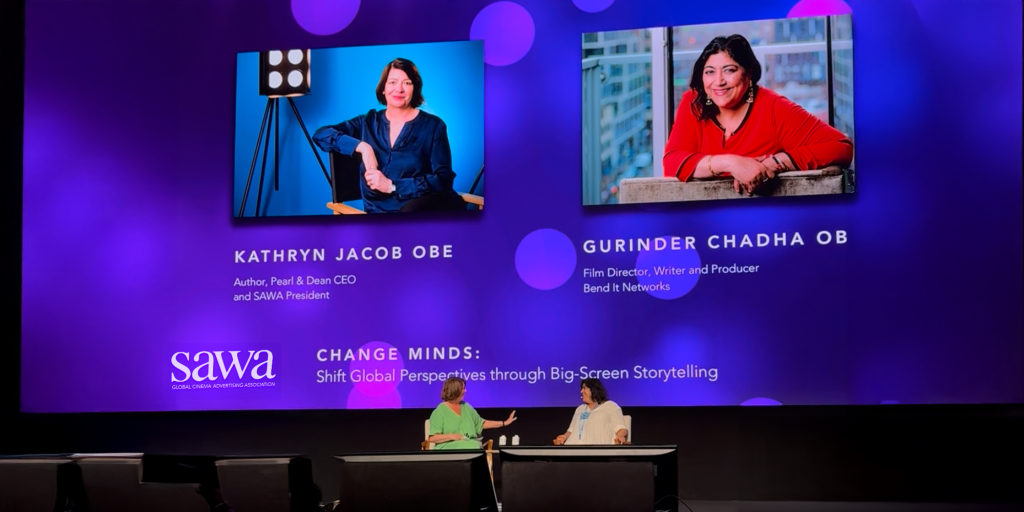June 30, 2025

A report from the SAWA-hosted session on the power of big screen storytelling at Cannes Lions 2025
When filmmaker Gurinder Chadha OBE stepped onto the Cannes Lions stage alongside SAWA President Katharine Jacob OBE, she brought with her a powerful statistic that would define their 30-minute conversation. Since the release of Bend It Like Beckham in 2002, female football registrations in the UK have exploded from 50,000 to over 800,000.
“That’s not just entertainment,” Chadha said during the session titled “Changing Minds: Shift Global Perspectives Through Big-Screen Storytelling.” “That’s cinema changing the world.”
For Chadha, who grew up “yearning to see people who looked like me on screen center stage, as opposed to on the margins,” cinema represents something profound: the ability to reshape how entire societies think and feel. But what makes the big screen uniquely powerful isn’t just the stories it tells—it’s how those stories are experienced.
“Seeing a film in a collective space is that reminder of the universality of emotions and who we are,” Chadha observed. This shared viewing experience, where diverse audiences come together in a single space, creates a unique opportunity for perspective-shifting that other media simply cannot replicate.
Jacob, drawing on her extensive background in cinema advertising, reinforced this point by highlighting how the big screen environment amplifies every message. When stories reach audiences in this immersive, collective setting, they don’t just reflect culture—they actively create it.
Central to Chadha’s approach is a sophisticated understanding of audience psychology that has direct relevance for anyone crafting messages for the big screen. “I always start with the perspective of the audience,” she explained. “What is the audience thinking? How am I going to shift their opinions? I know what you’re expecting, and then I change it, and I shift it.”
This technique of meeting audiences where they are before challenging their assumptions proved transformative for Bend It Like Beckham. Rather than depicting the typical “immigrant rebellion” narrative, Chadha showed a supportive Sikh family encouraging their daughter’s dreams. By subverting expectations, she normalized what audiences initially saw as foreign or different.
“My job is to reach out to your heart, to help you feel heard, feel alive and make you rethink what is around you,” Chadha said, articulating a mission that extends far beyond entertainment.
Chadha’s insights proved particularly relevant when the conversation turned to today’s fragmented media landscape. In an era where audiences can skip, scroll, or click away in seconds, the challenge for all content creators—whether filmmakers or advertisers—has intensified.
“Our job as creatives is even harder now,” Chadha noted. “We need to surprise the audience.” For advertising specifically, she emphasized the need for “a twist in there to stop people’s [skipping] and go, ‘Oh, I love this.'”
The parallel between effective filmmaking and effective advertising became clear: both require authentic storytelling that connects emotionally while challenging preconceptions. Both benefit from the unique power of the cinema environment to create shared, immersive experiences.
Throughout the session, both speakers emphasized that authentic representation isn’t merely a moral imperative—it’s strategic storytelling. When audiences see themselves reflected authentically in stories, they feel “heard” and become more receptive to the messages being conveyed.
For Chadha, this representation serves a larger purpose: “Cinema allows you to change the world.” By “bringing you into the home” of cultures unlike your own, cinema builds empathy and understanding across differences. Professional athletes have credited her films with inspiring their careers, demonstrating how big-screen storytelling can create real-world change.
The session, part of Cannes Lions’ Changemakers track, underscored a crucial point for anyone working in advertising: the medium shapes the message. The cinema environment—with its scale, immersion, and collective viewing experience—amplifies the impact of every story told there.
As Jacob and Chadha’s conversation revealed, cinema’s power lies not just in its ability to entertain, but in its capacity to shift perspectives, challenge assumptions, and inspire action. For brands and storytellers alike, the big screen offers something increasingly rare in our fragmented media world: the chance to create shared experiences that genuinely change how people think and feel.
Chadha left a lasting note on cinema’s power to shape the world—an enduring reminder that messages on the big screen carry both influence and the ability to change perspectives.
This session was hosted by SAWA (the global cinema advertising association) at Cannes Lions Festival of Creativity 2025. SAWA represents cinema advertising companies worldwide, including Motivate Val Morgan in the Middle East.
Related Articles:
Showmanship and Salesmanship: Why Cinema is Key to Long-Term Brand Growth
The Power of Summer: The Big Screen’s Golden Season for Advertisers